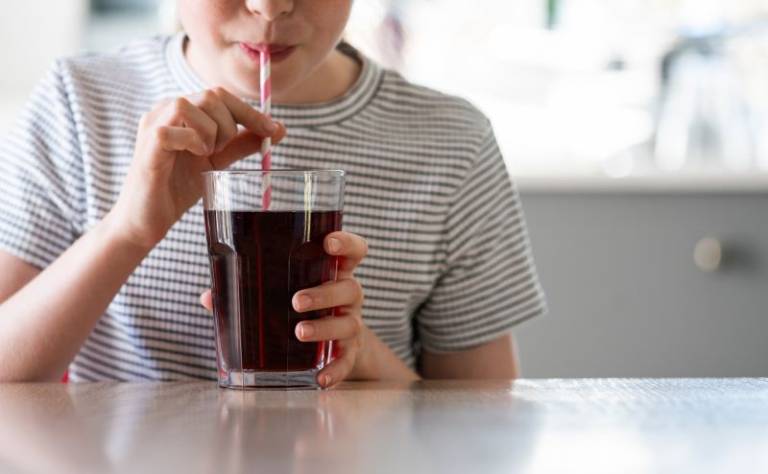UK soft drinks levy linked to fall in child hospital admissions for tooth extraction
15 November 2023
The UK soft drinks industry levy, which was introduced in 2018, may have reduced the number of under 18s having a tooth removed due to tooth decay by 12%, finds a new study co-authored by a UCL researcher.

The research, published in BMJ Nutrition, Prevention & Health, found that the largest reductions were in children aged up to nine years old and estimated that more than 5,500 hospital admissions for tooth extraction may have been prevented each year.
Co-author, Dr Oliver Mytton (UCL Great Ormond Street Institute of Child Health), said: “Tooth decay is preventable, and sadly remains an important cause of hospital admission for children. Our study estimates that the tax on sugary drinks prevented around 5,500 admissions for tooth extraction in children in England in 2020. It provides further evidence of the valuable contribution of this measure to improving children’s health.”
Before the introduction of the soft drinks levy, sugar-sweetened drinks accounted for around 30% of the added sugars in the diets of children aged one to three years and over 50% by late adolescence.
In England, nearly 90% of all tooth extractions in young children are due to decay, resulting in around 60,000 missed school days a year.
The WHO has recommended a tax on sugar-sweetened drinks to reduce sugar consumption, which 50 countries have implemented.
In March 2016, the UK government announced a soft drinks industry levy or ‘sugar tax’, which aimed to reduce sugar intake and help prevent childhood obesity, by encouraging drinks manufacturers to reformulate their products. The levy was implemented in April 2018.
The new study suggests evidence of other possible benefits to children’s health beyond weight-related issues.
The relationship between sugar-sweetened drinks and tooth decay is well established. However, this is the first study to use real-world data to examine the relationship between the levy and dental health.
Researchers analysed hospital admissions data for tooth extractions due to tooth decay in children aged 0 to 18 years old in England from January 2012 to February 2020, four years before the 2016 announcement, to almost two years after the levy was introduced (in 2018). They took into account neighbourhood deprivation and the children’s age.
Overall, in children aged 18 and under, there was an absolute reduction in hospital admissions of 3.7 per 100,000 population per month, compared to if the soft drinks levy had not taken place. This equated to a relative reduction of 12% compared to if the levy was not introduced.
Based on a population of around 12.7 million children aged 0-18 years in England in 2020, the researchers estimated a reduction of 5,638 hospital admissions for decay-related tooth extraction.
Reductions in hospital admissions were greatest in younger children aged 0-4 years and 5-9 years respectively.
Lead author, Dr Nina Rogers (University of Cambridge), said: “This is an important finding given that children aged five to nine are the most likely to be admitted to hospital for tooth extractions under general anaesthesia”.
No significant changes in admission rates were seen in older age groups of 10–14 years and 15–18 years.
Study limitations
This is an observational study so causality can’t be established, and the researchers acknowledge there was no comparable control group so they could not fully attribute the changes in hospital admissions to the soft drinks levy.
Additionally, other national interventions such as the sugar reduction programme and compulsory nutrition labels may have raised public awareness of sugar consumption and influenced buying habits, alongside the levy.
Links
- Research in BMJ Nutrition, Prevention & Health
- Dr Oliver Mytton's academic profile
- UCL Great Ormond Street Institute of Child Health
- UCL Population Health Sciences
Image
- Daisy-Daisy on iStock
Media contact
Poppy Danby
E: p.danby [at] ucl.ac.uk
 Close
Close

